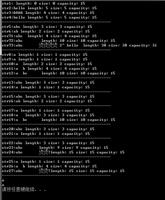在 NumPy 中将掩码数组的泡菜作为字符串返回
要腌制掩码数组,请使用ma. MaskedArray.dumps()方法。使用Numpy中的方法将泡菜加载回数组。掩码数组是标准和掩码的组合。掩码要么是 nomask,表示关联数组的任何值都无效,要么是布尔数组,用于确定关联数组的每个元素的值是否有效。pickle.loads()numpy.ndarray
NumPy 提供全面的数学函数、随机数生成器、线性代数例程、傅里叶变换等。它支持广泛的硬件和计算平台,并且可以很好地与分布式、GPU 和稀疏数组库配合使用。
脚步
首先,导入所需的库 -
import numpy as npimportnumpy.maas ma
使用该方法创建一个包含 int 元素的数组-numpy.array()
arr = np.array([[55, 85, 68, 84], [67, 33, 39, 53], [29, 88, 51, 37], [56, 45, 99, 85]])print("Array...\n", arr)
print("\nArray type...\n", arr.dtype)
获取数组的维度 -
print("Array Dimensions...\n",arr.ndim)创建一个屏蔽数组并将其中一些屏蔽为无效 -
maskArr = ma.masked_array(arr, mask =[[1, 1, 0, 0], [ 0, 0, 1, 0], [0, 0, 0, 1], [0, 1, 0, 0]])print("\nOur Masked Array\n", maskArr)
print("\nOur Masked Array type...\n", maskArr.dtype)
获取 Masked Array 的尺寸 -
print("\nOur Masked Array Dimensions...\n",maskArr.ndim)获取蒙面阵列的形状 -
print("\nOur Masked Array Shape...\n",maskArr.shape)获取 Masked Array 的元素数量 -
print("\nElements in the Masked Array...\n",maskArr.size)要腌制掩码数组,请使用 ma. 方法 -MaskedArray.dumps()
pickArr = maskArr.dumps()
显示泡菜 -
print("\nPickle of the masked array...\n",pickArr)使用以下方法将泡菜加载回数组-pickle.loads()
resArr = pickle.loads(pickArr)
显示结果数组 -
print("\nLoading the pickle back to the masked array...\n",resArr)示例
import numpy as np输出结果importnumpy.maas ma
import pickle
# Create an array with int elements using the numpy.array() method
arr = np.array([[55, 85, 68, 84], [67, 33, 39, 53], [29, 88, 51, 37], [56, 45, 99, 85]])
print("Array...\n", arr)
print("\nArray type...\n", arr.dtype)
# Get the dimensions of the Array
print("\nArray Dimensions...\n",arr.ndim)
# Create a masked array and mask some of them as invalid
maskArr = ma.masked_array(arr, mask =[[1, 1, 0, 0], [ 0, 0, 1, 0], [0, 0, 0, 1], [0, 1, 0, 0]])
print("\nOur Masked Array\n", maskArr)
print("\nOur Masked Array type...\n", maskArr.dtype)
# Get the dimensions of the Masked Array
print("\nOur Masked Array Dimensions...\n",maskArr.ndim)
# Get the shape of the Masked Array
print("\nOur Masked Array Shape...\n",maskArr.shape)
# Get the number of elements of the Masked Array
print("\nElements in the Masked Array...\n",maskArr.size)
# To pickle the masked array, use the ma.MaskedArray.dumps() method
pickArr = maskArr.dumps()
# Display the pickle
print("\nPickle of the masked array...\n",pickArr)
# Load the pickle back to array using the pickle.loads() method
resArr = pickle.loads(pickArr)
# Display the resultant array
print("\nLoading the pickle back to the masked array...\n",resArr)
Array...[[55 85 68 84]
[67 33 39 53]
[29 88 51 37]
[56 45 99 85]]
Array type...
int64
Array Dimensions...
2
Our Masked Array
[[-- -- 68 84]
[67 33 -- 53]
[29 88 51 --]
[56 -- 99 85]]
Our Masked Array type...
int64
Our Masked Array Dimensions...
2
Our Masked Array Shape...
(4, 4)
Elements in the Masked Array...
16
Pickle of the masked array...
b"\x80\x02cnumpy.ma.core\n_mareconstruct\nq\x00(cnumpy.ma.core\nMaskedArray\nq\x01cnumpy\nndarray\nq\x02K\x00\x85q\x03X\x01\x00\x00\x00bq\x04tq\x05Rq\x06(K\x01K\x04K\x04\x86q\x07cnumpy\ndtype\nq\x08X\x02\x00\x00\x00i8q\t\x89\x88\x87q\nRq\x0b(K\x03X\x01\x00\x00\x00<q\x0cNNNJ\xff\xff\xff\xffJ\xff\xff\xff\xffK\x00tq\rb\x89c_codecs\nencode\nq\x0eX\x80\x00\x00\x007\x00\x00\x00\x00\x00\x00\x00U\x00\x00\x00\x00\x00\x00\x00D\x00\x00\x00\x00\x00\x00\x00T\x00\x00\x00\x00\x00\x00\x00C\x00\x00\x00\x00\x00\x00\x00!\x00\x00\x00\x00\x00\x00\x00'\x00\x00\x00\x00\x00\x00\x005\x00\x00\x00\x00\x00\x00\x00\x1d\x00\x00\x00\x00\x00\x00\x00X\x00\x00\x00\x00\x00\x00\x003\x00\x00\x00\x00\x00\x00\x00%\x00\x00\x00\x00\x00\x00\x008\x00\x00\x00\x00\x00\x00\x00-\x00\x00\x00\x00\x00\x00\x00c\x00\x00\x00\x00\x00\x00\x00U\x00\x00\x00\x00\x00\x00\x00q\x0fX\x06\x00\x00\x00latin1q\x10\x86q\x11Rq\x12h\x0eX\x10\x00\x00\x00\x01\x01\x00\x00\x00\x00\x01\x00\x00\x00\x00\x01\x00\x01\x00\x00q\x13h\x10\x86q\x14Rq\x15Ntq\x16b."
Loading the pickle back to the masked array...
[[-- -- 68 84]
[67 33 -- 53]
[29 88 51 --]
[56 -- 99 85]]
以上是 在 NumPy 中将掩码数组的泡菜作为字符串返回 的全部内容, 来源链接: utcz.com/z/297116.html





